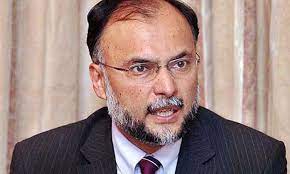Continuity of policies key to CPEC success: Ahsan Iqbal

Quetta: Minister for Planning, Development and Special Initiatives Ahsan Iqbal has said that continuity of policies was key to success of the China-Pakistan Economic Corridor (CPEC).
The minister made these remarks while addressing 36th Annual General Meeting (AGM) of the Pakistan Society of Development Economists (PSDE) here. The conference was organized by the Pakistan Institute of Development Economics (PIDE) in collaboration with Balochistan University of Information Technology, Engineering, and Management Sciences (BUITEMS). The theme of the conference was ‘Charter of Economy: Investment, Productivity, and Employability’.
The minister highlighted the expansion of university campuses in remote areas of Balochistan by the Planning Commission from 2013-18.
He urged the need for “political stability and policy continuity” for the success of economic initiatives like the CPEC.
Earlier in the day, Chinese Foreign Ministry spokesperson Zhao Lijian acknowledged contribution of Minister for Planning, Development and Special Initiatives Ahsan Iqbal by calling him an active supporter of progress under CPEC.
Zhao Lijian remarked that Ahsan Iqbal had been an active supporter of progress under the CPEC. “We appreciate that,” he added.
Zhao Lijian made these statements while replying to a question on CPEC progress particularly on ML-1 railway project, Gwadar international airport and Karachi Circular Railway at a news conference in Beijing.
Moreover, the Chinese spokesperson stated that China stands ready to work with Pakistan to follow through common understandings which came under discussion during Prime Minister Shehbaz Sharif’s visit to China where he met Chinese President Xi Jinping.
At the 36th AGM of the PSDE, Ahsan Iqbal emphasized the importance of inclusive development. He stressed that the incumbent government had started a special project to uplift 20 poorest districts of Pakistan, “out of which 11 are of Balochistan.”
Last month, the Ministry had launched a special development initiative worth Rs 40 billion for 20 backward and poor districts of the country. The minister is expected to visit the 20 poorest districts next month. The 11 districts of Balochistan include Sherani, Kohlu, Jhal Magsi, Barkhan, Killa Abdullah, Zhob, Musakhel, Dera Bugti, Jaffarabad, Ziarat and Killa Saifullah.
“This is the first of its kind project in the economic history of Pakistan where the Federal government is undertaking a national intervention to uplift the poorest districts and address the disparity in economic development,” said the minister.
Ahsan also highlighted a short-term economic agenda of the incumbent government in the form of 5Es which include enterprise, exports, equity in society through strengthened health and education.
The identification of the 20 poorest districts for accelerated growth programme, E-Pakistan and empowerment of youth, energy efficiency and conservation, and environment and food security were among the 5Es.





